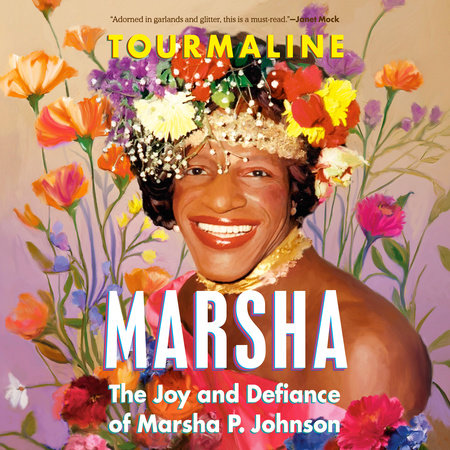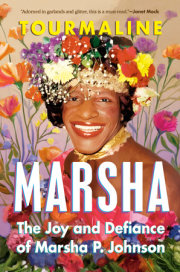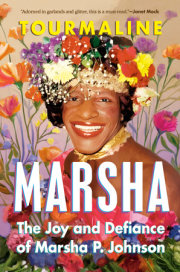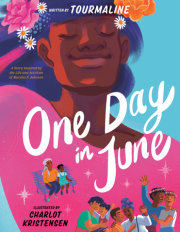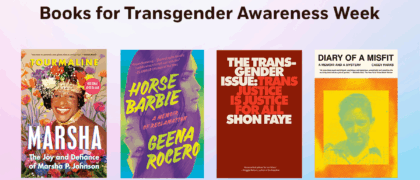Chapter 1
Marsha,
the Jersey Kid
On a rainy day in early June 1992 Marsha sat in the cozy kitchen of a West Village apartment surrounded by an eclectic group of friends from across her artistic circle. The kitchen, small and unassuming, buzzed with a mix of anticipatory laughter and the kind of quiet intimacy of friends trading memories.
Tony "Fish" Nunziata, Marsha's friend from the theater, hovers over his stove filling the room with the aroma of meatloaf and soup, darting back and forth to Marsha to make sure she's well-fed. Earlier that month Tony organized some of his friends to start a documentary centering the beauty and power of Marsha P. Johnson.
As Tony crafts a cappuccino for Marsha, Rick Morrison-another downtown New York luminary and friend of Marsha-lights a cigarette, and the filmmaker Mike Kasino, who met Marsha for the first time that night, sets up his camera, ready to document the evening's narratives. The room is charged with an electric energy, especially from Tony, who views Marsha with deep admiration. Despite her weariness from walking miles in the rain during the AIDS Walk a day earlier, Marsha's spirit is undiminished, her readiness to share her story as vibrant as ever.
Adorned in a green dress with a palm tree motif, pants peeking from underneath, and a neon magenta sequin hat, Marsha radiates charisma. Her sandy brown hair, gold sequin headband, and stud earrings complement her animated storytelling. The conversation turns to her childhood and her mother's humorous dating advice, sparking giggles with Marsha's playful realization of its falsehood:
"My mother said, 'Don't worry, you'll meet a millionaire daddy who will take care of you!' Lies! Nowadays, you can't fool children. Children catch on very fast."
Marsha then reflects on the censored television programming of her youth, with observations that draw hearty laughter from her friends, as she traces her childhood naïveté back to the innocent portrayals of family life she saw on television.
"Honey, when I was a child, there was no such thing as homosexuals on TV! It was all about I Love Lucy and The Brady Bunch, all these decent respectable families."
As the evening unfolds and the camera rolls on Marsha, the kitchen transforms into a sanctuary of history, hope, and storytelling.
It was during moments like these that Marsha often found herself reflecting on the journey from her childhood in Elizabeth to the vibrant heart of Greenwich Village. It was a journey marked not only by the challenges she faced but also by the love and lessons from those who had shaped her earliest days, especially her mother.
Marsha's mother, Alberta Claiborne, was from Elizabeth, and her father, Malcolm Michaels Sr., had moved from Virginia to Linden, New Jersey, as part of the Great Migration. They married and settled in Elizabeth, a largely working-class Black and Italian town. They had six children: Alfred, Charles, Bob, Jeannie, Norma, and Marsha, then known to her family as Malcolm Michaels Jr., and affectionately as Mikey.
Elizabeth at the time of Marsha's birth was a racially segregated city, and the Michaels family, as a Black household navigating systemic racism, offered each other support and care. Within their neighborhood, there were many different nationalities and there was a feeling of safety from anti-Black racism. At the same time, there were distinct white Italian sections in Elizabeth where Black people were not welcomed.
During the time of Marsha's childhood, the city of Elizabeth was already on the cusp of becoming a center for civil rights activism. Shortly after Marsha turned two, Elizabeth emerged as a battleground for civil rights. In 1947, a significant moment unfolded as Granville Nesbitt, a key NAACP leader and a pillar in Elizabeth's African American community, joined forces with Stephen Sampson, a determined Black veteran. Together, they launched a pivotal protest against the discriminatory practices of a local Howard Johnson's restaurant and hotel. With a demand for equality, their protest mobilized approximately one hundred people to encircle the venue in a powerful demonstration. This act of defiance not only challenged the status quo but also laid the groundwork for the civil rights movement in Elizabeth, igniting a spark of activism that future generations would continue to carry forward. Years later, Marsha, having been shaped by this early activism, chose to adopt "Johnson" from Howard Johnson's as her new surname.
Stephen Sampson would later found a barber shop four minutes from Marsha's home, which Marsha's nephew Al recalls as a neighborhood fixture. Inside he built a library of African American history and made a rule that to get a haircut at his barber shop you first needed to learn how to operate a voting machine. This level of civic engagement in Elizabeth cultivated in Marsha a deep sense of justice.
The legacy of the Black freedom movement in Elizabeth, New Jersey, continued through the 1960s. Blatant racial discrimination in employment spurred waves of civil rights activism. The exclusion was starkly visible when African American workers were overlooked for jobs in the Union County Courthouse construction. Local labor unions, steeped in racial and gender biases of the times, opened their doors only to white men, often those with familial ties within the union. This racist exclusion ignited fierce demonstrations in 1964, culminating on August 11 in a significant revolt that echoed through Elizabeth and mirrored upheavals in Paterson, New Jersey. Fueled by a deep-seated frustration over police violence, housing disparities, and economic sidelining, these protests forcefully demanded change, including calls for better housing and fair rent practices. This wave of activism didn't just challenge existing inequalities; it set the stage for a broader dialogue on civil rights, housing justice, and economic inclusion.
During Marsha's childhood, social life for LGBTQIA+ people in New Jersey happened largely underground. After Prohibition ended, New Jersey established the Alcohol Beverage Control (ABC), giving its director the power to set rules for alcohol consumption. This meant that liquor license holders were expected to follow state guidelines. Bar owners faced penalties if they allowed patrons who did not conform to traditional gender expectations, violating ABC's Rules 4 and 5. These rules related to how licensees should conduct themselves and use their premises. ABC agents, upon observing individuals they believed were openly expressing non-traditional gender identities, would report on their clothing, body language, and voice pitch. These reports could lead to accusations of "female impersonation" or "male impersonation." Such charges, sometimes along with other violations or even just the presence of individuals perceived as queer, could result in legal actions and fines against the bar owners. The New York Times reported an instance from 1939 when a tavern in Newark was temporarily shut down after serving a man who presented himself in makeup and spoke in a notably feminine tone. The ABC commissioner wrote, "It is clear that homosexuals may well have a harmful effect on some members of the public. Furthermore, where they congregate and conduct themselves in the manner hereinbefore related, they are a threat to the safety and morals of the public."
In Marsha's hometown of Elizabeth, there were at least five bars catering to LGBTQIA+ customers, including trans and gender nonconforming individuals, with Billy's Tavern being among the most famous for its drag shows. Located at 1060 Magnolia Avenue, Billy's Tavern was especially notable for displaying photos of drag performers on its walls. This visibility, however, led ABC agents to repeatedly suspend its liquor license, citing the presence of trans and gender nonconforming patrons as justification.
Despite their actions against these establishments, the reports filed by ABC agents on places like Billy's Tavern inadvertently provided a window into the thriving LGBTQIA+ underground social scene in Elizabeth. On one occasion, January 2, 1961, undercover ABC agents entered Billy's Tavern, having been informed by the bartender of a scheduled drag show that evening.
Their accounts of the event are detailed and vivid. Upon arrival, they positioned themselves at a table in the back room to watch. The bar was bustling with about twenty-five patrons of various genders. One report specifically highlighted a group of "female impersonators" whose extravagant attire caught their attention: one in a pink dress and earrings, another in a gold blouse and bullfighter-style pants adorned with long earrings and a blond streak in their hair, a third in a string skirt, with additional accessories like earrings, a chest cloth, a bracelet, and a leg flower, and another in women's shorts, shoes, and sweater. Each had makeup, lipstick, and hair styled in a feminine way.
The show began shortly after, with one of the drag queens, Sally Mitchell, taking the stage to host and perform. Sally's performance mixed sexy dance moves with humorous commentary on the audience. According to one agent, Sally executed a series of suggestive dances that culminated with her lying on the floor in a provocative manner, which the crowd enthusiastically applauded. Following this, the ABC suspended Billy's Tavern's license for 190 days, claiming the venue permitted "lewdness, immoral activity, and foul, filthy, and obscene conduct," and accused it of tolerating "female impersonators" on the premises.
The vibrant but underground LGBTQIA+ scene in Elizabeth, including the events and characters within spaces like Billy's Tavern, formed an underground backdrop to many stories of identity and community. This environment, ripe with both joy and violence, provides a historical context to the early life of one of the most iconic figures in LGBTQIA+ history. As the ABC agents documented their observations, little did they know they were also capturing fragments of a world that nurtured individuals like Marsha P. Johnson.
Marsha was raised amid these shifting social norms and expectations. Born into a society with predefined paths based on race and gender, the script for Marsha's life seemed already written: to embody the role of a respectable Black man who followed a traditional path of education, employment, and family life. However, Marsha's journey would diverge significantly from these expectations, driven by an inner conviction to live loudly and authentically. Marsha was not interested in conforming to the societal expectations of her time, and soon she would stop identifying with the gender assigned to her at birth.
The first time Marsha cross-dressed was at age five. "I started doing drag when I was just a little kid running around the house," she said. She felt alive and filled with wonder, playing in her sister's clothes, sneaking her mother's makeup, and wobbling around the house in her mother's too-big heels, barely able to balance, giggling with delight. Her family chastised her quickly: Little boys don't dress that way; go take that off and stop messing around. She was confused, and though she didn't understand why it was bad to dress in the feminine clothes she adored, she stopped, afraid of getting into trouble. Later in her life, Marsha lamented, "It's hard to get your parents to understand you as a gay person, and especially if you're a transvestite." Back then, though, she didn't even have the words for who she was-she just knew that who she was had somehow been deemed unacceptable, someone who she should hide.
Both she and her brother Bob Michaels recall playing dress up as children, but for Marsha it was a part of how she was coming to understand her emergent gender and sexual difference. As she became an adolescent, she would have consensual sexual experiences with her next-door neighbors. But she still felt really naive about the world of sexuality, even believing that the stork brought children. "I thought God just picked out the children and that they were angels. And he just picked out one and sent one at a time and then picked out another one and sent them like, 'Boy, girl, boy, girl, that one should have a boy, that one should have a girl.' Because my whole childhood, I just lived in dreamland." Without a road map to understand who she was, or models to look to for different kinds of love, Marsha came to think of sex as something unreal-a dream, a whisper, a faraway fantasy.
Even though her mother, Alberta, never allowed Marsha to wear girls' clothing, Marsha still revered her, later naming her mother as one of her role models for living life as a woman. When Marsha was a child, Alberta found employment as a domestic worker, and she knew how to make every resource count, sewing clothes for the entire family. "I could always do things that women do because I was raised by my mother," Marsha explained. "Like, I could wash, I could iron, I could cook, I could sew. My mother was poor, she had to do it all herself." None of Marsha's siblings were interested in learning sewing skills, so Marsha was her mother's lone pupil. Domestic work was and largely still is considered gendered work, and while her mother may have taught Marsha these skills because they could not afford otherwise, Marsha understood these as lessons on how to become a woman. She lovingly reminisced about those times together learning the careful practice of domestic labor, and she would carry on this labor as a form of care work for her community in the decades to come. Marsha centered her understanding of the role of class in shaping domestic life, telling her friends that although some could hire domestic help or buy new clothes, her mother couldn't.
Marsha describes her mother as doing it all herself because Alberta had separated from her husband, Malcolm Michaels Sr., when Marsha was three years old. Marsha's father moved back to neighboring Linden, where he lived with his mother and worked at the General Motors plant. He still maintained a central role in his children's lives. An excellent cook, he would make Sunday night dinners to host his children.
Marsha's family, which included her mother and seven siblings, including Harold, a sibling from Alberta's first marriage, resided in a quaint house on Washington Avenue in the vibrant center of Elizabeth. Their mornings began with the rural sounds of chickens from a neighbor's yard and were accompanied by the inviting aroma of fresh bread from the bakery next door. Reflecting on those days, Marsha humorously remembered the simplicity and the hardships, including the use of wood stoves for heating. Marsha recalls it well, saying, "We had to go outside for wood and my mother used to send me out for wood in the snow, saying, 'Honey we gotta have wood for that fire!' I mean, people don't know how lucky we are these days."
Marsha first glimpsed a world beyond Elizabeth in the dim lights of her local movie theaters. With several venues within reach, she and her siblings would embark on cinematic adventures at the Little Theater, where twenty-five cents unlocked a triple feature of second-run films. On luckier days, gathering thirty-five cents meant they could immerse themselves in the latest blockbuster. It was within these transporting spaces that Marsha's dreams began to take shape, dreams of one day shining as brightly as the stars on the screen. Among her cherished films was The Ten Commandments, but in the end it was not Charlton Heston who influenced her the most but the actress Billie Burke. Although most known for her role as the Good Witch in The Wizard of Oz, Burke popularized the trope of the "ditzy bimbo" in previous films, filling the roles with hidden depth and becoming a role model for Marsha. This inspiration came to life in Marsha's performances, especially when performing Christmas carols with her siblings, which showcased Marsha's flair and the subtle genius she admired in Burke.
Copyright © 2025 by Tourmaline. All rights reserved. No part of this excerpt may be reproduced or reprinted without permission in writing from the publisher.

